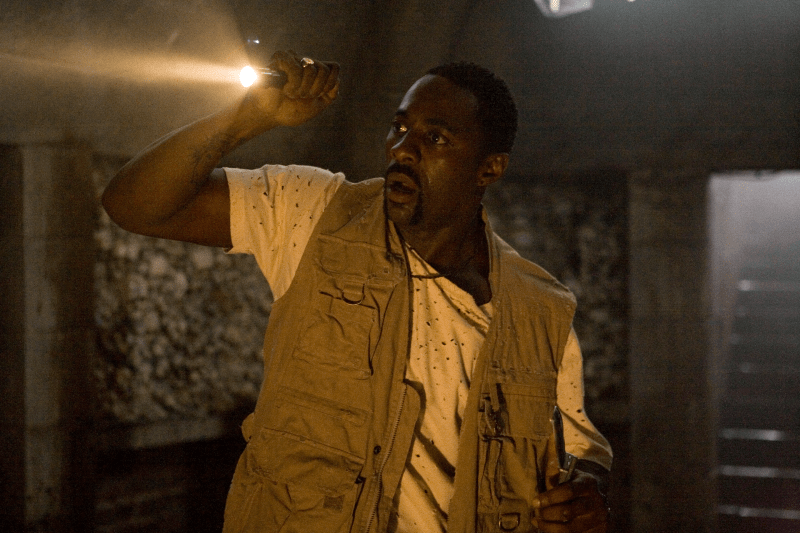Last month, we took a look at the ways Satanic Panic uses common Christian concepts to highlight the outdated notion of female virginity. This month, we’re diving into another Uterus Horror film rooted in Christianity: The Reaping, written by Chad and Carey W. Hayes (The Conjuring, House of Wax) and directed by Stephen Hopkins (A Nightmare on Elm Street: The Dream Child, Predator 2).
This 2007 horror film follows a college professor named Katherine (Hilary Swank). A former ordained minister who lost her family and her faith after a tragic incident while doing missionary work in Africa, Katherine now investigates and debunks supposed religious miracles. Katherine and her colleague Ben (Idris Elba) are called to a small town in Louisiana to investigate a river that appears to have turned to blood. The town is convinced the river is just the first of the ten biblical plagues and more unearthly dangers are coming. What’s worse, the town is blaming these plagues on a 12-year-old girl named Loren (AnnaSophia Robb).
The Reaping is very much about Katherine’s emotional and religious journey. On the surface, it serves as religious propaganda about someone who rediscovers their lost faith after witnessing proof of God. Yet, if you dig a bit deeper, you will discover Loren’s story, although it is told through Katherine. When Loren and Katherine meet for the first time, Katherine realizes Loren is experiencing her first period. Katherine even makes a comment to Loren, saying, “This is your body’s way of telling you you’re becoming a woman,” as she tries to help Loren clean up. The moment Katherine comes into contact with Loren’s blood, she sees a flash of the girl’s memories. She sees Loren being chased by her older brother through the swamp before he suddenly drops dead, with no injuries or indication of what killed him. The memory clearly depicts the inciting incident that triggered the plagues in this small town as the river turns to blood.
At first, Katherine feels sympathy for Loren, especially since she’s about the same age as Katherine’s late daughter. Yet things become more desperate as the town experiences more plagues. The townsfolk all believe Loren is to blame. The only voice of reason is the local science teacher, Doug (David Morrissey), who helps Katherine and tries to convince the town that a child couldn’t have caused the strange events. After the town endures a river of blood, dead frogs, lice, flies, diseased cattle, and boils, the evidence does not seem to be in Loren’s favor. With just four plagues left, Katherine learns of an ancient prophecy about a Satanic cult. In this cult, each firstborn child is left unharmed to carry on the genetic line while the secondborn is sacrificed at puberty. The prophecy states there will be one perfect second child that will have the eyes of Satan. At the same time, God will send down an angel to destroy this child of the Devil, and this angel cannot be harmed by the cult members.
Katherine hurries to Loren’s home, trying to beat the angry mob of townsfolk there. It’s here that Katherine witnesses the plague of locusts, seemingly controlled by Loren as they attack the mob there to kill her. Katherine becomes convinced Loren is the child of prophecy, and Katherine herself must be the angel sent to destroy her. She follows Loren to the ruins of an old church as the sky turns black and fire rains from above. As Katherine is about to kill Loren, she touches the girl, and the whole truth is revealed.
Katherine sees Loren strapped to a sacrificial table, surrounded by people from the town, as she is about to be sacrificed as a secondborn child now at puberty. She escapes and is chased by her brother. When he catches up to her and tries to kill her, God intervenes, and the brother dies instead. Loren is not the child of Satan but the angel sent by God to stop the cult. Doug, who turns out to be the leader of the cult, attempts to trick and manipulate Katherine into harming Loren as none of the cult members are able to hurt her. With the truth revealed, Katherine saves Loren as the rest of the town, who are all firstborn children, are killed by the final plague.
Despite the very pro-Christian message of the film, it brings to light some interesting points about how young women are perceived in Christianity. Something we have seen in past Uterus Horror films weaponizing Christian views—such as The Witch and Carrie—is that women only have value when they are prepubescent children or mothers. Even though Loren was always fated to be a sacrifice, the cult waits until she hits puberty. Puberty is already a frightening time. The Reaping emphasizes that fear by connecting Loren’s first period with being sacrificed. Her ticking biological clock is a countdown to her death.
Another interesting thing to note is how the town is able to convince Katherine that Loren is evil. A majority of The Reaping is simply the town trying to make Katherine believe Loren is a child of the Devil and must be killed. At first, Katherine dismisses this notion because she no longer believes in God or Satan, but eventually, she is convinced. Katherine only believes the town after a white male priest misinterprets the prophecy. Katherine’s former colleague, Father Costigan (Stephen Rea), is the one to learn of the prophecy and relay this information to her. He’s the one who tells Katherine that Loren must be the child of Satan and that Katherine herself is the angel sent by God.
Father Costigan so easily places the blame on an innocent little girl. What’s worse is that Katherine eventually believes Loren is to blame as well until she is faced with the truth. It feels reminiscent of historical witch trials when religious white men in power sentenced women to death for daring to challenge patriarchal beliefs. Based on Katherine’s actions throughout the film, it’s clear she didn’t believe Loren was at fault until she started to believe in God and the Devil again. This implies that Katherine wouldn’t have believed Loren was evil or tried to kill her if Katherine hadn’t been influenced by religion.
The Reaping is an accidental Uterus Horror film. Looking past Katherine’s journey to rediscover her faith in the Christian God reveals the more subtle story of Loren. In showing Loren experiencing her first period, the filmmakers made that moment in Loren’s life even more horrifying because it’s also her death sentence within the cult. Yet, even more fascinating and disturbing is how easy it was for the town to convince Katherine that Loren was evil, as rational thought is overpowered by religious belief. The Reaping ends up conveying two hidden messages. The first is that innocence doesn’t end simply because a child starts menstruating. The second, and maybe more important, is to never let religious belief overpower rationality, lest we repeat history by condemning women who don’t conform to those beliefs.






